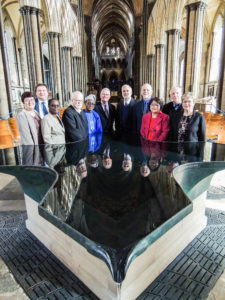For some, the term “ecumenical dialogue” evokes images of theologians meeting in reflective spaces to discuss weighty ecclesiastical, liturgical and theological subjects.
But those conversations also have an “immensely practical” value, said Curtis Freeman, professor of theology and director of the Baptist House of Studies at Duke Divinity School. Freeman recently participated in a round of meetings in Salisbury, England, aimed at fostering understanding that might lead to cooperative ministry between Baptists and Methodists.

Curtis Freeman
And that’s no small feat for two groups that share a history of misunderstanding, suspicion and, at one time, open animosity.
“Part of the goal in this was spending more time recognizing we can learn to trust one another,” Freeman said of the one-week discussions held annually since 2014.
The talks have been held under the auspices of the Baptist World Alliance and the World Methodist Council. The Baptist and Methodist delegations will present reports to the two world bodies in July. They also are crafting a study guide to help small groups and congregations work toward inter-denominational understanding and cooperation.
The potential payoff is less theological than it is missional — though theological differences still must be overcome, Freeman said.
“My question is, can Baptists and Methodists view one another as partners in God’s mission in the world? Or will we be competitors in a diminishing market?”
But Freeman and other delegates aren’t naïve about the theological obstacle posed by “the baptism question.”

Participants in the 2018 Baptist-Methodist dialogue in Salisbury, England. (Photo/Courtesy of Curtis Freeman)
That question is how can the Baptists with their believers baptism work with Methodists who practice infant baptism?
The answer isn’t in convincing either Baptists or Methodists to renounce their own practices or to adopt the others,’ Freeman said. Instead, delegates sought common ground in how each approach spiritual formation and sharing the gospel.
Baptists might come to see infant baptism is merely the beginning of “a whole process of Christian initiation” which has parallels to the value Baptists place on life-long discipleship, he said.
It’s also important to focus on the missions and ministry of Methodists around the nation and the world.
Approached in those ways, it’s possible Baptist-Methodist alliances can be fostered in communities in need of a united Christian ministry and witness, Freeman said.
“Can Methodists fulfill the Great Commission? I want to push to say we really need to face that,” Freeman said. “The church in North America is facing some difficult days ahead.”
A failure to partner with other Christians “is going to be a very isolating life,” he added.
The aim of the ecumenical process was not to merge Baptists and Methodists into one large institution, Freeman said. Instead, it is to enable the two traditions to bring their different gifts to bear in a common way that benefits society, he said.
“God’s commission in the world depends on us,” Freeman said.


